The Big Read: Thanks to technology, school does not end when the bell rings

(Anti-clockwise from top right) Riverside Primary School teacher Mdm Jacqueline Kho, Mdm Angelia Teew, mother of Riverside Primary School students Engracia See, 8 and Ezekiel See, 7. Photo: Robin Choo/TODAY

SINGAPORE — From daily email updates to chat groups and mobile applications that allow parents to communicate directly with teachers and track their children’s progress, the advancement in communications technology has dramatically altered the parent-teacher relationship here.
Gone are the days when parents and teachers only saw and heard from each other during Meet-the-Parents sessions held once or twice a year.
While parents seem to generally abide by unspoken boundaries — such as not contacting teachers after office hours and not hounding them over trivial matters — problems occur when expectations are not made clear: Some teachers lament that they can receive up to two messages a day on average from parents, sometimes during off-work hours and even on public holidays. The parents would, for example, ask about homework and school activities, or inform the teachers that their child is sick.
Nevertheless, most teachers whom TODAY spoke to welcomed the direct engagement with parents. One of the more popular options among teachers is setting up a WhatsApp group with the parents.
A primary school teacher, who declined to be named, said: “There is a direct point of contact without everything going through school leaders, the principal or the minister. At least the WhatsApp (messages) will come to me.”
A teacher from another primary school, who wished to be known only as Mr Tan, noted that in his group chats, parents help to answer one another’s questions when he is unable to respond immediately.
The Ministry of Education (MOE) provides guidelines on educators’ interaction with parents and the community, via the Code of Professional Conduct.
Principals said they also have internal guidelines and these are communicated to parents and teachers. They stressed that teachers are given the flexibility to adopt the most suitable methods of engagement based on their own preference and the profile of their students.
MOE said: “The underpinning principles include the building of mutual trust and respect with parents in making decisions that are in the best interest of their child, and the exercising of professional integrity and judgement in communicating and working with parents.”
It noted that technology has allowed for more convenient interactions between parents and teachers. “These communications are thoughtfully calibrated to ensure relevance and timeliness and both teachers and parents should maintain a mutual respect for each other’s personal time,” said MOE, which reiterated that communication with parents is “an essential part of an educator’s role to provide feedback on their students’ development and well-being”.
With both parents working in a typical Singaporean household, it can be difficult for teachers to contact them during work hours.
But Mdm Jacqueline Kho, 31, a chinese teacher at Riverside Primary School who prefers not to give her contact number to parents, has found a solution: Using a mobile app called Class Dojo, she is able to broadcast announcements and reminders to parents. The app, which comes with a chat function allowing parents to contact her directly, doubles up as a motivational tool. A teacher can award points to pupils for good behaviour and class performance, and parents will be able to see how their child is doing in school.
A demo of the ClassDojo app for teachers and students
She noted that it was necessary to establish a positive parent-teacher relationship, which would ultimately benefit the pupils. “Parents were very receptive when I introduced the application. They gave me feedback that they were able to raise questions at any time and they were able to catch up on the information disseminated,” she said. “This application has helped me to enhance my communication with parents and there are other technology tools that can achieve this objective as well.”
An example of teacher-parent engagement using the Class Dojo app
Mdm Angelia Teew, whose daughter is in Mdm Kho’s Primary 2 Chinese class, said the app gives a good indication of her daughter’s progress in school. “We more or less know how my girl is progressing... We see improvement in her work in terms of quality because she’s motivated by the points (awarded by the teacher),” said 39-year-old housewife.
Another parent, Mr Donald Ng, 42, whose two children are enrolled in Pei Chun Public School, had received daily email updates from their form teachers up until mid-way through Primary 2. The emails kept parents in the loop about what was taught in class that day, the homework to be completed, and important announcements such as spelling test dates. “As a parent, I didn’t expect that,” said Mr Ng, whose daughter and son are now 11 and eight years old respectively. Adding that it was a good initiative by the teacher, he noted that parents would benefit as some children may not be able to express themselves well and the instructions from teachers can be unclear.
Mr Lai Hon Kit, 39, a form teacher at Ngee Ann Secondary School, said that by involving parents, they would feel welcomed, respected and valued as partners in the education of their child. “I have passed my mobile number to some parents… Parents are mostly considerate and if they message late at night, it is because they are urgent and necessary,” said Mr Lai.
In order to manage parents’ expectations, Mr Tan said it all boils down to making clear the ground rules right from the start. “I tell (parents) that when they message me after 6pm, expect me to reply the next day,” he said.
Changkat Primary School Principal May Tang said she informs parents that teachers are not obliged to share their personal contact details and for those who do, parents who contact the teachers after working hours will be attended to the next working day.
Mrs Tang said that at her school, parents of children with special learning needs may require more frequent engagement with teachers. “They’re very worried about whether their children are fitting in, whether they are able to learn, whether the children are happy so that’s why they would like to get some updates from the teachers,” she said.
While communications technology has been a boon to fostering better parent-teacher ties, some educators cautioned against adopting it blindly, without considering the profiles of the students and their families.
Ang Mo Kio Secondary School principal Abdul Mannan, 43, said that in his school, teachers tailor their approaches accordingly. “For example, if the majority of the parents of a particular class do not have email addresses, the teacher will contact the parents via phone,” he said.
He noted that there are families who do not have Internet access or email addresses, and they are usually less well to do. He estimated that about 10 per cent of the students in his school come from these households.
Mr Manan’s teachers uses a combination of a mass SMS system, Whatsapp, email and class blogs to keep parents in the loop. The school also requires all form teachers to call parents within the first 10 weeks of the school term to update them on how their child is doing.
Mr Jeremy See, 35, a form teacher of a Normal (Technical) class at Woodlands Ring Secondary School, relies on traditional means of communication - phone calls and SMS. He said that his students’ parents prefer face-to-face meetings.
“When I see (the parents) and I ask them questions like, would you be interested to know your child’s performance during the term, they would say yes, of course, so we are waiting to come and see you at the designated time (arranged by the school,” he said.
Despite the popularity of communications technology among parents and educators, some parents, like Ms Ginny-Ann Oh, 41, worry about the side effect on children, who could be deprived of the chance to learn about personal responsibility. “It is not for mummy or daddy to constantly check back with other people, be it with teachers or fellow parents, on the amount of homework that you have, ensure you know when your next spelling test is… There has to be a certain amount of independence and self-reliance,” said Ms Oh, who has a 10-year-old son and a nine-year-old daughter.
She added that the way some teachers constantly keep parents up-to-date has become excessive and the time could be better spent on helping the students. She is not a fan of using Whatsapp to communicate with her children’s teachers. She prefers to send emails, as this method allows more time for her and the teachers to craft their messages.
Stressing the importance of face-to-face interaction between parents and teachers, Mr See said that messaging tools could run the risk of miscommunication. “If I’m using text, I’m not sure if I’ll be able to accurately describe the situation, especially if it’s pertaining to the behaviour of the students or something of immediate concern,” he said.
Mrs Tang added: “I always tell my teachers that if it’s routine updating or giving of instructions, you can use technology. But if it’s about relationships, it’s best to meet face-to-face.”
For parents and teachers alike, they are adjusting to a very different environment — compared to what they were used to when they were schooling themselves — and they acknowledged that it is not necessarily a bad thing.
“In my time, meeting the teachers … was always an ‘uh oh’ moment because you’ve done something wrong,” Ms Oh said. Back then, report cards brought home by students were the main form of updates and if teachers wanted to meet parents, it would be usually up to the children to inform their parents, she said.
Mr Ng said he barely recalls his parents meeting his teachers when he was a child. “Even having a pupil’s diary and the teachers asking students to write down their homework is a big departure from what we did,” he said.
Mr Manan said that in the past, parents would allow their children to be more independent and they would not insist on knowing how their children were coping. “But I think now, more and more parents really want to be involved, even for students in secondary level... parents also want us to alert them if the child is not doing well, so they can help on their side,” he said.









